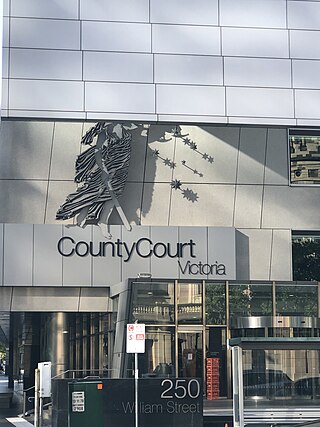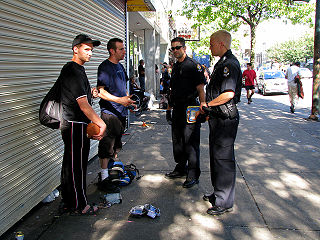An indictment is a formal accusation that a person has committed a crime. In jurisdictions that use the concept of felonies, the most serious criminal offense is a felony; jurisdictions that do not use that concept often use that of an indictable offence, an offence that requires an indictment.

In many common law jurisdictions, an indictable offence is an offence which can only be tried on an indictment after a preliminary hearing to determine whether there is a prima facie case to answer or by a grand jury. A similar concept in the United States is known as a felony, which for federal crimes, also requires an indictment. In Scotland, which is a hybrid common law jurisdiction, the procurator fiscal will commence solemn proceedings for serious crimes to be prosecuted on indictment before a jury.

Inhalants are a broad range of household and industrial chemicals whose volatile vapors or pressurized gases can be concentrated and breathed in via the nose or mouth to produce intoxication, in a manner not intended by the manufacturer. They are inhaled at room temperature through volatilization or from a pressurized container, and do not include drugs that are sniffed after burning or heating.
Life imprisonment is any sentence of imprisonment for a crime under which the convicted criminal is to remain in prison for the rest of their natural life. Crimes that result in life imprisonment are extremely serious and usually violent. Examples of these crimes are murder, torture, terrorism, child abuse resulting in death, rape, espionage, treason, illegal drug trade, human trafficking, severe fraud and financial crimes, aggravated property damage, arson, hate crime, kidnapping, burglary, robbery, theft, piracy, aircraft hijacking, and genocide.

The High Court of Justiciary is the supreme criminal court in Scotland. The High Court is both a trial court and a court of appeal. As a trial court, the High Court sits on circuit at Parliament House or in the adjacent former Sheriff Court building in the Old Town in Edinburgh, or in dedicated buildings in Glasgow and Aberdeen. The High Court sometimes sits in various smaller towns in Scotland, where it uses the local sheriff court building. As an appeal court, the High Court sits only in Edinburgh. On one occasion the High Court of Justiciary sat outside Scotland, at Zeist in the Netherlands during the Pan Am Flight 103 bombing trial, as the Scottish Court in the Netherlands. At Zeist the High Court sat both as a trial court, and an appeal court for the initial appeal by Abdelbaset al-Megrahi.
Attempted murder is a crime of attempt in various jurisdictions.

A sheriff court is the principal local civil and criminal court in Scotland, with exclusive jurisdiction over all civil cases with a monetary value up to £100,000, and with the jurisdiction to hear any criminal case except treason, murder, and rape, which are in the exclusive jurisdiction of the High Court of Justiciary. Though the sheriff courts have concurrent jurisdiction with the High Court over armed robbery, drug trafficking, and sexual offences involving children, the vast majority of these cases are heard by the High Court. Each court serves a sheriff court district within one of the six sheriffdoms of Scotland. Each sheriff court is presided over by a sheriff, who is a legally qualified judge, and part of the judiciary of Scotland.
A hybrid offence, dual offence, Crown option offence, dual procedure offence, offence triable either way, or wobbler is one of the special class offences in the common law jurisdictions where the case may be prosecuted either summarily or on indictment. In the United States, an alternative misdemeanor/felony offense lists both county jail and state prison as possible punishment, for example, theft.
Culpable homicide is a categorisation of certain offences in various jurisdictions within the Commonwealth of Nations which involves the homicide either with or without an intention to kill depending upon how a particular jurisdiction has defined the offence. Unusually for those legal systems which have originated or been influenced during rule by the United Kingdom, the name of the offence associates with Scots law rather than English law.

The courts of Scotland are responsible for administration of justice in Scotland, under statutory, common law and equitable provisions within Scots law. The courts are presided over by the judiciary of Scotland, who are the various judicial office holders responsible for issuing judgments, ensuring fair trials, and deciding on sentencing. The Court of Session is the supreme civil court of Scotland, subject to appeals to the Supreme Court of the United Kingdom, and the High Court of Justiciary is the supreme criminal court, which is only subject to the authority of the Supreme Court of the United Kingdom on devolution issues and human rights compatibility issues.

Jamieson v HM Advocate is a notable legal case which established a precedent in Scotland which held that a man does not commit rape where he honestly, albeit unreasonably, believes his victim is consenting. This was a criminal case decided by the High Court of Justiciary sitting as the Court of Criminal Appeal. The appeal case was heard before a panel of three judges with the Lord Justice-General as president, with Lord Allanbridge and Lord Cowie. The case is reported at 1994 SLT 537.

Possession of stolen goods is a crime in which an individual has bought, been given, or acquired stolen goods.
The declaratory power, in Scots law, is an unusual power held by the High Court of Justiciary, which enables it to declare behaviour to be criminal, even if that behaviour had not been previously defined as criminal activity.

The Criminal Law Act 1977 is an act of the Parliament of the United Kingdom. Most of it only applies to England and Wales. It creates the offence of conspiracy in English law. It also created offences concerned with criminal trespass in premises, made changes to sentencing, and created an offence of falsely reporting the existence of a bomb.

Transco plc v Her Majesty's Advocate2003 HCJAC 67 is a Scots criminal law case that involved the first Scottish prosecution of a public limited company for culpable homicide. The decision is considered significant in Scots law on corporate criminal liability.

Scots criminal law relies far more heavily on common law than in England and Wales. Scottish criminal law includes offences against the person of murder, culpable homicide, rape and assault, offences against property such as theft and malicious mischief, and public order offences including mobbing and breach of the peace. Scottish criminal law can also be found in the statutes of the UK Parliament with some areas of criminal law, such as misuse of drugs and traffic offences appearing identical on both sides of the Border. Scottish criminal law can also be found in the statute books of the Scottish Parliament such as the Sexual Offences (Scotland) Act 2009 and Prostitution (Scotland) Act 2007 which only apply to Scotland. In fact, the Scots requirement of corroboration in criminal matters changes the practical prosecution of crimes derived from the same enactment. Corroboration is not required in England or in civil cases in Scotland. Scots law is one of the few legal systems that require corroboration.

Moorov v His Majesty's Advocate1930 JC 68 is a Scots criminal and evidence law case that concerns admissibility of similar fact evidence. The High Court of Justiciary established the Moorov doctrine in its judgment, which is predominantly used in criminal prosecutions involving allegations of rape and sexual abuse.

Ross v HM Advocate1991 JC 210 is a leading Scots criminal case that concerns automatism as defence. The High Court of Justiciary clarified the rules for an accused to successfully argue automatism as a defence to a criminal charge.
The importance of corroboration is unique to Scots criminal law. A long-standing feature of Scots law, the requirement for corroborating evidence means at least two independent sources of evidence are required in support of each crucial fact before an accused can be convicted of a crime. This means, for example, that an admission of guilt by the accused is insufficient evidence to convict in Scotland, because that evidence needs to be corroborated by another source.

The Scottish Sentencing Council is an advisory non-departmental public body in Scotland that produces sentencing guidelines for use in the High Court of Justiciary, sheriff courts and justice of the peace courts. Judges, sheriffs, and justices of the peace must use the guidelines to inform the sentence they pronounce against a convict, and they must give reasons for not following the guidelines.









